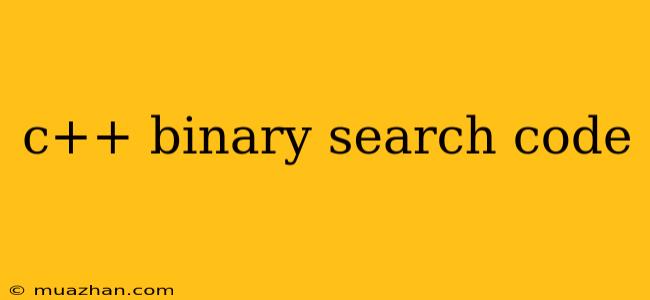C++ Binary Search Code Explained
Binary search is a highly efficient algorithm for finding a specific element within a sorted array. It works by repeatedly dividing the search interval in half. Here's a detailed breakdown of the C++ implementation and its key concepts:
1. Understanding Binary Search
The core idea behind binary search is to:
- Start with the middle element: Find the middle element of the sorted array.
- Compare: Compare the target value with the middle element.
- If they are equal: You've found the target element.
- If the target is smaller: The target must be in the left half of the array. Discard the right half.
- If the target is larger: The target must be in the right half of the array. Discard the left half.
- Repeat: Repeat steps 1 and 2 with the new half of the array until you find the target or the search interval becomes empty.
2. C++ Code Implementation
#include
using namespace std;
int binarySearch(int arr[], int left, int right, int target) {
while (left <= right) {
int mid = left + (right - left) / 2; // Calculate the middle index
if (arr[mid] == target) {
return mid; // Target found at index mid
} else if (arr[mid] < target) {
left = mid + 1; // Search in the right half
} else {
right = mid - 1; // Search in the left half
}
}
return -1; // Target not found
}
int main() {
int arr[] = {2, 3, 4, 10, 40};
int n = sizeof(arr) / sizeof(arr[0]);
int target = 10;
int result = binarySearch(arr, 0, n - 1, target);
if (result == -1) {
cout << "Element is not present in the array";
} else {
cout << "Element is present at index " << result;
}
return 0;
}
3. Breakdown of the Code:
binarySearch(int arr[], int left, int right, int target): This function performs the binary search.int arr[]: The sorted array to search in.int left: The starting index of the search interval.int right: The ending index of the search interval.int target: The element to search for.
while (left <= right): The loop continues until the search interval becomes empty (left > right).int mid = left + (right - left) / 2;: Calculates the middle index of the interval, avoiding potential overflow issues.if (arr[mid] == target): If the middle element matches the target, the index is returned.else if (arr[mid] < target): If the target is larger, the search continues in the right half by updatinglefttomid + 1.else: If the target is smaller, the search continues in the left half by updatingrighttomid - 1.return -1;: If the target isn't found, the function returns -1.
4. Time Complexity:
Binary search has a time complexity of O(log n), where n is the size of the array. This makes it incredibly efficient for searching large datasets.
5. Key Points:
- Sorted Array: Binary search requires a sorted array.
- Logarithmic Time: The time complexity makes it much faster than linear search (O(n)) for larger arrays.
- Recursive Implementation: Binary search can also be implemented recursively.
By understanding the logic and code structure, you can effectively implement binary search in your C++ programs to efficiently locate elements within sorted data.
